Master “What is Democracy Why Democracy” (CBSE Class 9) in 60 Mins!
No More Confusion | Exam Shortcuts Inside
Struggling with…?
❌ “Too many definitions!”
❌ “How to remember features vs. examples?”
❌ “Why learn arguments for/against democracy?”
❌ “Will this even come in boards?”
Meet Kartik & Kavya — your chill study buddies who turn textbook chaos into clarity with comics, tables, and MCQs! 😎
In This Chapter, You’ll Discover:
🔥 4 Non-Negotiable Features of Real Democracy (Spoiler: Pakistan & Zimbabwe FAILED these!)
💡 Why “Elected Leaders” ≠ Democracy (Kenya & Mexico’s SHAM elections exposed!)
📜 Broader Meaning – Democracy isn’t just govt… it’s in your family, school, even pizza choices! 🍕
✨ CBSE Golden Tips – How to write 5-mark answers using “Arguments For/Against Democracy”!
Kartik’s Reaction: “Wait, democracy can avoid FAMINES?!”
Kavya’s Punchline: “Yes! And dictatorships get exposed here 👇…”
Start Reading → Conquer democracy’s confusion in <60 mins! ⏱️💯
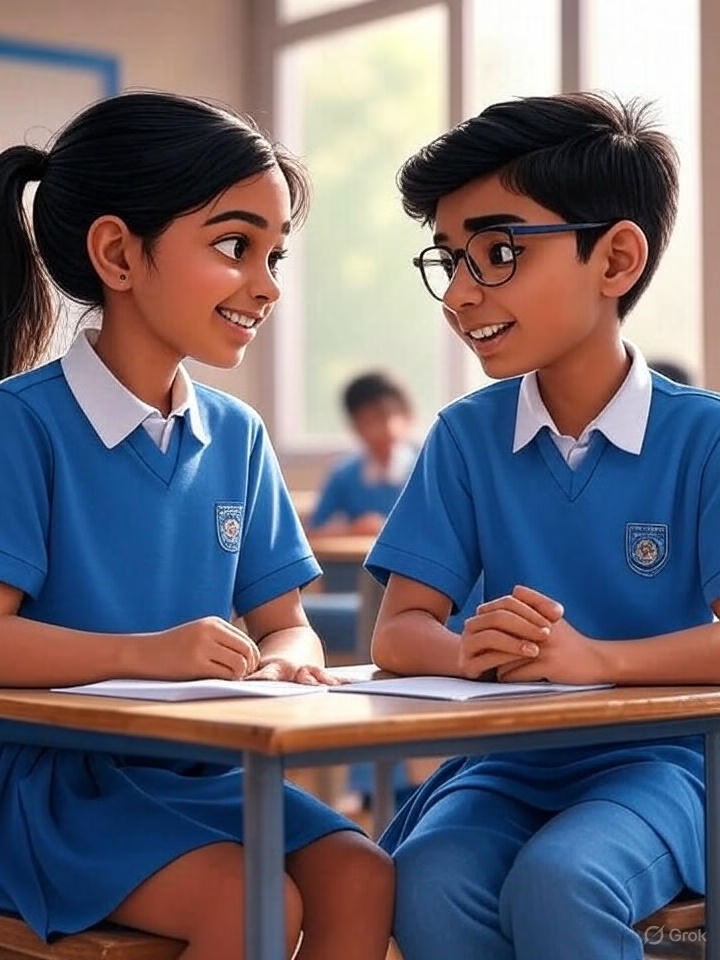
Table of Contents
What is Democracy?”
(Kartik & Kavya Break It Down)
Kartik: Hey Kavya! 🤔 Ready to tackle this big question: “What is Democracy?” It’s like Lyngdoh Madam says—we can’t just swallow definitions blindly. We gotta chew on ideas ourselves!
Kavya: Totally! 🧠 Yolanda jumps in with the Greek roots—demos (people) + kratia (rule). But Madam shuts that down with the computer example! 💻 Originally for math, now for Netflix? Words evolve!
🗳️ Simple Definition vs. Reality
| Concept | What It Means | Problem |
|---|---|---|
| Greek Roots | “Rule by the people” | Meanings change (like “computer”!) ⌛ |
| Basic Definition | Rulers elected by people | Separates democracies from dictatorships 🚫👑 |
| Real-World Flaw | “Elected = Democratic?” | Fake democracies hold sham elections! 🎭 |
Kartik: Madam’s point hits hard! Saudi kings rule by birthright 👑, Myanmar’s army seized power 🔫—no people’s choice there. But then…
Kavya: Holds up a finger 🚨 Wait! If “elected = democracy,” why do some elected leaders act like dictators? Think: What makes an election REAL?
Kartik: Exactly! Madam warns: Don’t be fooled by labels. Some governments pretend to be democracies. Like a wolf in sheep’s clothing! 🐺➡️🐑
Kavya: So we need to dissect the word—what does “rule” mean? “People”? “Elected”? 🤯
❓ Critical Thinking Zone
- Yolanda says democracy = Greek roots. Lyngdoh Madam disagrees. Who’s right?
- Hint: Is “phone” only for voice calls today? 📱✨
- If a country holds elections but jails opposition leaders, is it democratic?
- What would YOU call it?
📝 Quick MCQ Check
- Why does Lyngdoh Madam reject only using Greek roots?
a) Greek is outdated
b) Words evolve beyond origins
c) She dislikes Yolanda
d) Computers prove her point
(Correct: b) ✅ - What’s the core flaw in defining democracy as “elected rulers”?
a) Kings inherit power
b) Some elected rulers abuse power
c) Armies stage coups
d) All of the above
(Correct: d) ✅
Kavya: This chapter’s genius is showing democracy isn’t just voting—it’s about power staying with the people. 🌍✊ If leaders ignore citizens after elections, is it still democracy?
Kartik: 100%! Like Merry said—no shortcuts. We must build our own definition! 🔨 What features would YOU add?
Kavya: I’d say:
- Free & fair elections 🗳️
- Rights protected (speech, protest) 📢
- Leaders accountable to laws ⚖️
Kartik: Nods And no fake emergencies to cancel elections! 🙅♂️
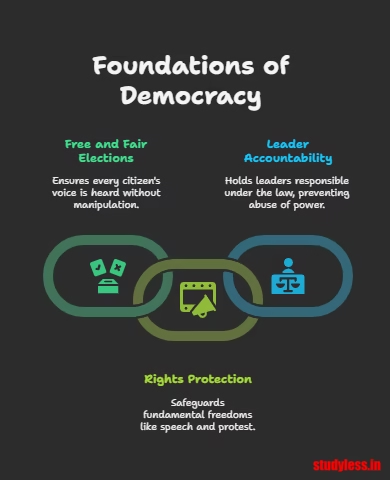
💭 Final Reflection
Kavya: So… is democracy just a system or a spirit? 🤔
Kartik: Both! It’s like a bicycle—needs structure (wheels/elections) AND a rider (active citizens!). 🚴♂️ Could YOUR school be run democratically?
(Fist bump) 🤜🤛
Keep questioning, legends! 🔥
To the point : Democracy isn’t a static textbook term—it’s a living practice. Your voice matters in defining it! 🎤💬

Features of Democracy
Kavya: Kartik, remember our simple definition? “Democracy = Rulers elected by people”? 🤔 This chapter shows why that’s just Step 1!
Kartik: Yeah! Lyngdoh Madam warned us about fake democracies 🎭. Now we see how they trick people—like in Pakistan under General Musharraf! 🇵🇰
⚖️ The Pakistan Test Case
| What Seemed Democratic | The Ugly Reality |
|---|---|
| Elections held | Musharraf seized power via military coup! 👊 |
| “Referendum” for President | Massive fraud & malpractice exposed 🗳️❌ |
| Elected assemblies existed | Real power stayed with unelected army 🪖 |
| Cabinet of ministers | Supervised by military National Security Council 🔐 |
Kavya: So creepy! Musharraf’s “Legal Framework Order” let him dismiss elected assemblies. Sound like democracy to you?
Kartik: NO WAY! People voted, but final power wasn’t with them. It’s like letting students elect a class monitor… but the teacher vetoes all decisions! 🚫🙋♂️
Features of Democracy :
- Major decisions by elected leaders
- Free and Fair electoral competition
- One person one vote one value
- Rule of law and respect of rights
Major decisions by elected leaders
🎯 Feature #1
“In a democracy, the final decision-making power must rest with those elected by the people.”
Kavya: This kills two fake-democracies:
- Dictatorships (like Musharraf): Army pulls strings 🪢
- Puppet Governments: External powers control leaders 🧸
Kartik: Exactly! If “rulers” can’t actually rule, it’s NOT democracy!
❓ Critical Thinking Questions
- What if your school principal could override every student council decision?
- Would student elections still matter? 🏫
- Can a country be democratic if only RICH people can run for office? 💰
📝 Quick MCQ Check
- Why wasn’t Pakistan under Musharraf a true democracy?
a) No elections were held
b) Elected reps lacked final decision power
c) Citizens couldn’t vote
d) It was a monarchy
(Correct: b) ✅ - What’s the FIRST essential feature of democracy?
a) Frequent elections
b) Elected leaders hold supreme power
c) Freedom of speech
d) Multi-party system
(Correct: b) ✅
Kavya: This chapter exposes democracy’s core skeleton! 🦴 Without elected leaders having real power, it’s just theater!
Kartik: And get this—Musharraf’s sham referendum proves: Elections alone ≠ Democracy. What else do we need? 🤔 (Spoiler: Next chapter!)
💭 Final Reflection
Kavya: Imagine you’re elected class president, but teachers ignore your proposals. How would you fight for real power? ✊
Kartik: I’d organize a student union! 💥 Makes you realize—democracy isn’t given; it’s demanded!
(Fist bump) 🤜🤛
Stay woke, future leaders! 🔥
To the point: Democracy’s heartbeat is power in people’s hands—not armies, kings, or puppeteers. Guard it fiercely! 🛡️🗳️
Free and Fair electoral competition
Kartik: Whoa, Kavya! This chapter hits hard. We just learned elected rulers need real power… but now? Elections themselves can be FAKE! 😤
Kavya: 100%! Look at China & Mexico.
They hold elections, but no real choice. It’s like a magician’s trick—you think you’re choosing, but the result’s already fixed! 🎩✨
⚠️ The “Election” Scam Table
| Country | What Looks Democratic | The Dirty Truth |
|---|---|---|
| China | Regular elections every 5 years 🗳️ | • Only Communist Party-approved candidates can run! • Army appoints some MPs 👮♂️ • Ruling party never changes since 1930! |
| Mexico | Presidential elections every 6 years 📣 | • Ruling PRI party used threats/bribes 💰 • Teachers FORCED parents to vote PRI! 👩🏫 • Polling booths moved last-minute to stop voting! 🏃♂️ |
Kartik: China’s “choice” is like being asked: “Do you want water or… water?” 💧😑
Kavya: And Mexico? Even if 90% wanted change, PRI couldn’t lose. That’s not democracy—it’s dictatorship in disguise! 🎭
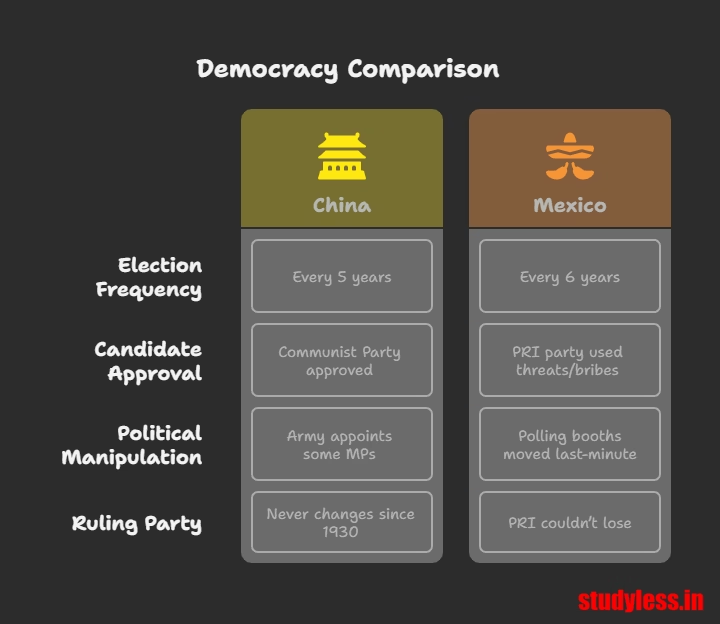
🎯 Feature #2: REAL Choice + Chance to Lose!
“Democracy must be based on free & fair elections where those in power can actually lose.”
Kartik: So TRUE democracy needs:
- 🤝 Multiple parties/choices
- 🗣️ No pressure on voters
- ❌ Rulers CAN be voted out!
Kavya: Otherwise? It’s just theater 🎭—like a school play where the teacher picks the “elected” class leader!
❓ Critical Thinking Questions
- What if your school only let “teacher-approved” students run for council? Would it be fair? 🏫
- How would YOU react if voting booths suddenly moved 10km away on election day? 🚗💨
📝 Quick MCQ Check
- Why were China’s elections undemocratic?
a) No elections were held
b) Only ruling-party candidates could run
c) Citizens boycotted polls
d) The army banned voting
(Correct: b) ✅ - What makes an election “free and fair”?
a) Incumbents always win
b) Voters choose without fear + opposition can win
c) Only educated people vote
d) Elections happen indoors
(Correct: b) ✅
Kavya: This chapter exposes the heartbeat of democracy: the fear of losing power keeps leaders honest! 💓✨
Kartik: Exactly! If rulers know they can’t be replaced, they turn into bullies 😤. Ever seen a class monitor who can’t be removed? Chaos!
💭 Final Reflection
Kavya: Imagine your favorite game has only ONE move allowed. Would you still play? 🎮 That’s China/Mexico’s “democracy”…
Kartik: So here’s my question: Can a country be democratic without opposition parties? 🤔
(Fist bump) 🤜🤛
Power to the people—FOR REAL! ✊
To the point: Free & fair elections are democracy’s oxygen. Never take them for granted! 🌬️🗳️
One Person, One Vote, One Value
Kavya: Kartik! We just learned elections need real choices… but what if not everyone’s vote counts equally? 😤 Look at Saudi Arabia until 2015—women couldn’t vote! 🙅♀️
Kartik: Whoa! And Fiji 🇫🇯 values Indigenous votes more than Indian-Fijians? Estonia 🇪🇪 blocks Russian minorities? That’s like saying some classmates get 2 votes in school elections! 🚫
🌍 Global Inequality Alert
| Country | Violation | Why It’s Undemocratic |
|---|---|---|
| Saudi Arabia | Women banned from voting (till 2015) 👑 | Denies half the population a voice! 🚺 |
| Estonia | Russian minorities struggle to vote 🪪 | Citizenship laws = silencing tool 🔇 |
| Fiji | Indigenous vote > Indian-Fijian vote 📊 | Votes aren’t equal ⚖️❌ |
Kavya: This isn’t just unfair—it shatters democracy’s core principle: political equality.
Kartik: Exactly! If votes aren’t equal, power isn’t with “the people” — it’s with chosen groups. Would YOU accept a game where some players start with 10 points? 🎮
🎯 Feature #3: ONE Person = ONE Vote = ONE Value!
“Each adult citizen must have one vote, and each vote must have one value.”
Kavya: No ifs, buts, or “except women/minorities/immigrants”. EVERY adult = EQUAL power. Period. 💥
Kartik: And get this: it’s why universal adult franchise (all adults can vote) was such a hard-won battle! 🔥
❓ Critical Thinking Questions
- What if your school gave class 12 students two votes, and class 9 students half a vote? 🏫
- Would student council represent everyone?
- Can a democracy exclude any group from voting? (Think: prisoners, immigrants, youth)
📝 Quick MCQ Check
- What’s the core issue in Fiji’s electoral system?
a) No elections held
b) All votes don’t have equal value
c) Women can’t vote
d) Only rich people vote
(Correct: b) ✅ - Why is “one vote, one value” essential?
a) It speeds up counting
b) It ensures political equality
c) It reduces election costs
d) It allows online voting
(Correct: b) ✅
Kavya: This principle exposes hidden hierarchies. Democracy isn’t just who votes—it’s how much each vote weighs! ⚖️
Kartik: And Saudi Arabia proves: denying women votes isn’t “tradition”—it’s power hoarding. Glad they changed in 2015! 🎉
💭 Final Reflection
Kavya: Imagine a pizza divided unequally because “some people matter more.” 🍕 Would you call that fair?
Kartik: So here’s the big Q: Should ANY adult lose voting rights? (Think criminals, non-citizens). Where would YOU draw the line?
(Fist bump) 🤜🤛
Equal votes = Equal dignity! ✨
To the point: Political equality isn’t negotiable in democracy. When votes aren’t equal, democracy becomes rule by the privileged. Guard this fiercely! 🛡️
Rule of law and respect of rights
Kavya: Kartik, we’ve seen fake elections and unequal votes… but Zimbabwe under Mugabe 🇿🇼? That’s next-level democracy slaughter! 😱 He won elections but crushed rights!
Kartik: Scary stuff! Popular ≠ Democratic. Mugabe changed constitutions like socks 🧦, jailed critics, and IGNORED courts! Sound like your idea of freedom?
⚠️ Mugabe’s Dictator Playbook
| Democratic Ideal | Zimbabwe’s Reality |
|---|---|
| Independent Judiciary 🧑⚖️ | Judges pressured; court orders ignored! |
| Free Speech 📢 | Illegal to criticize the President! Journalists harassed! |
| Fair Media 📺 | Govt-controlled TV/radio; only ruling party’s “truth”! |
| Right to Protest ✊ | Public demonstrations banned! |
| Rule of Law ⚖️ | Constitution rewritten to make Mugabe all-powerful! |
Kavya: He was the “elected” President for 37 years—but turned Zimbabwe into his personal kingdom 👑. Where’s the people’s power here?
Kartik: Exactly! Democracy isn’t just winning power—it’s limiting power! 🔒
🎯 Feature #4: Democracy = Power in Chains!
“A democratic government rules within limits set by constitutional law and citizens’ rights.”
Kavya: Translation: Leaders CAN’T do whatever they want! They must:
- Respect the constitution 📜
- Protect minority rights 👥
- Obey courts 🧑⚖️
- Allow criticism 🗣️
Kartik: Otherwise? It’s electoral dictatorship—like a school monitor who expels anyone questioning them! 🚫📚
❓ Critical Thinking Questions
- If your principal could change school rules daily to punish you, would you feel safe? 🏫
- Can a leader be “popular” if critics are silenced? (Hint: How do you measure real popularity?)
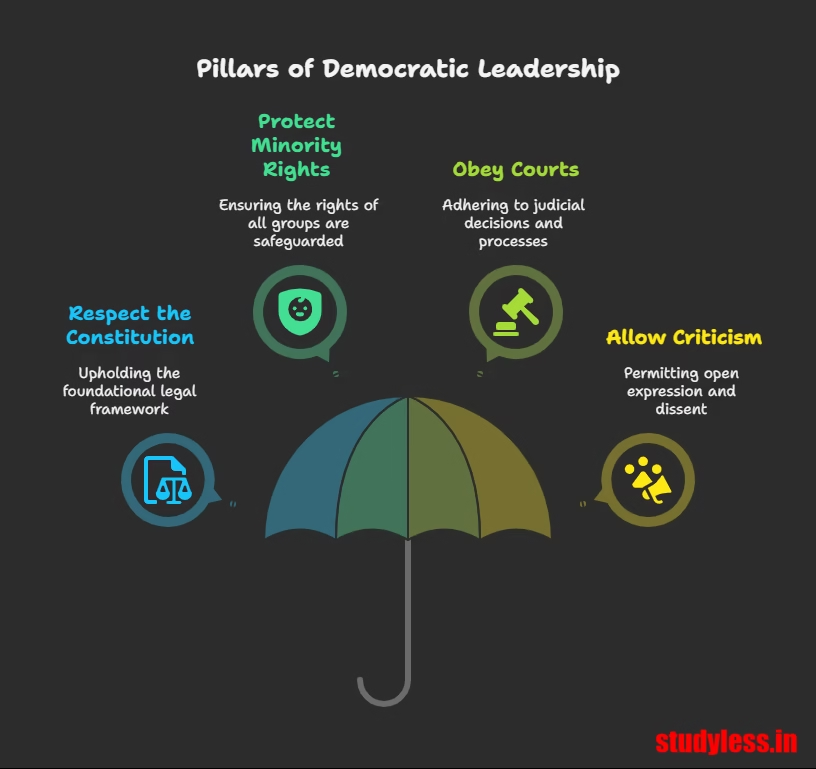
📝 Quick MCQ Check
- Why was Zimbabwe under Mugabe undemocratic despite elections?
a) No elections were held
b) Basic rights + rule of law were violated
c) Only one party existed
d) He wasn’t popular
(Correct: b) ✅ - What’s the core purpose of constitutional limits?
a) To make governance slower
b) To prevent power abuse + protect citizens
c) To help leaders stay popular
d) To allow media censorship
(Correct: b) ✅
Kavya: This chapter reveals democracy’s immune system: limits on power! Without it, leaders become viruses 🦠 killing freedom.
Kartik: And Mugabe’s fall in 2017 proves—people will revolt when rights are crushed too long! ✊
💭 Final Reflection
Kavya: Imagine a soccer ref who changes rules mid-game to help his team. ⚽ Would you keep playing? That’s Mugabe’s “democracy”…
Kartik: So here’s the Q: Should leaders EVER override constitutions for “emergencies”? (Think wars/pandemics). Where’s the line? 🤔
(Fist bump) 🤜🤛
Constitutions > Kings! ✨
To the point: Democracy’s strength lies in bounded power. When leaders ignore constitutions, democracy becomes tyranny in disguise. Stay vigilant! 👀🔍
What REALLY is Democracy?/ Summary definition
Kartik: Phew, Kavya! We’ve journeyed from a simple definition to uncovering democracy’s four pillars! Let’s stitch it all together!
Kavya: Absolutely! Our starter was: “Democracy = Elected rulers.” But now? We know that’s like calling a car “wheels” 🚗—too shallow!
🏛️ The 4 Non-Negotiable Features of Democracy:
| Feature | Why It Matters | Real-World Fail |
|---|---|---|
| 1. Elected Leaders Hold REAL Power | No puppets (Musharraf!) or royal families (Saudi!) 👑 | Pakistan’s army vetoing elected govt! 🪖 |
| 2. Free & Fair Elections | Rulers CAN lose! No fake choices (China/Mexico) 🗳️ | Mexico’s PRI party rigging polls! 🎭 |
| 3. One Vote = One Value | Every adult’s vote equal! No gender/minority bias (Saudi/Fiji) ✊ | Fiji valuing Indigenous votes higher! ⚖️ |
| 4. Power Has Limits! | Constitutions > Kings! Rights > Rulers! (Mugabe’s lesson) ⚖️ | Zimbabwe jailing journalists! 📢🚫 |
Kartik: So democracy isn’t just voting—it’s power in chains, choices that matter, and equality in action!
Kavya: Nailed it! Remove any pillar, and democracy crumbles into dictatorship in disguise 😈.
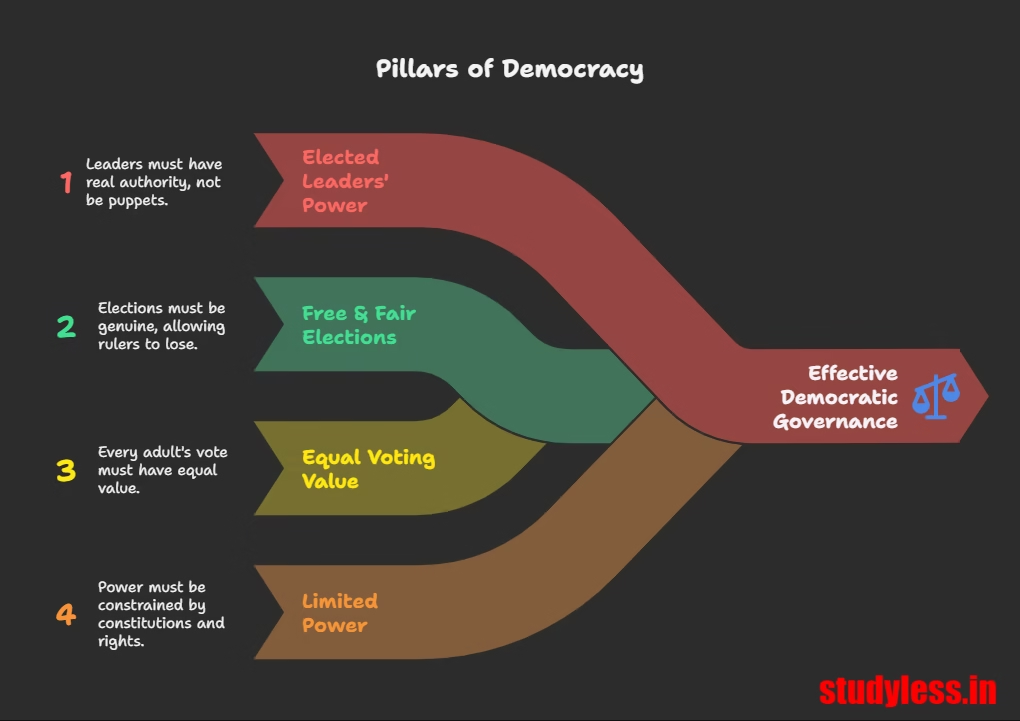
❓ Critical Thinking Check:
- If a country has Feature 1 & 2 but bans protests (Feature 4), is it democratic?
- Can a monarchy ever be democratic? (Hint: Feature 1!)
📝 Final MCQ Challenge:
- Which feature stops leaders from becoming dictators?
a) Elections alone
b) Constitutional limits + citizens’ rights
c) Universal voting
d) Multiple parties
(Correct: b) ✅ - Why is “One Vote, One Value” vital?
a) It speeds up counting
b) It ensures political equality
c) It reduces costs
d) It allows online voting
(Correct: b) ✅
Kartik: Remember Mugabe? He won elections but torched rights. Democracy isn’t a scoreboard—it’s a living ecosystem 🌳!
Kavya: Exactly! It needs all 4 organs to breathe:
- 💪 Empowered elected leaders
- 🔄 Accountability through real elections
- ⚖️ Equal voice for all
- 🛑 Constitutional guardrails
💭 Your Turn to Reflect!
Kavya: Imagine your school claims to be “democratic” but only teachers can vote. Which features are missing? 🏫
Kartik: And here’s the BIG one: Can democracy survive if people stop caring? 🤔
(Fist bump) 🤜🤛
You’re now democracy detectives! 🔍✨
To the point: Democracy isn’t a spectator sport. It needs active, informed citizens—like YOU! 🗳️💡
“Liberty lies in the hearts of the people; if it dies there, no constitution can save it.” — Justice Louis Brandeis
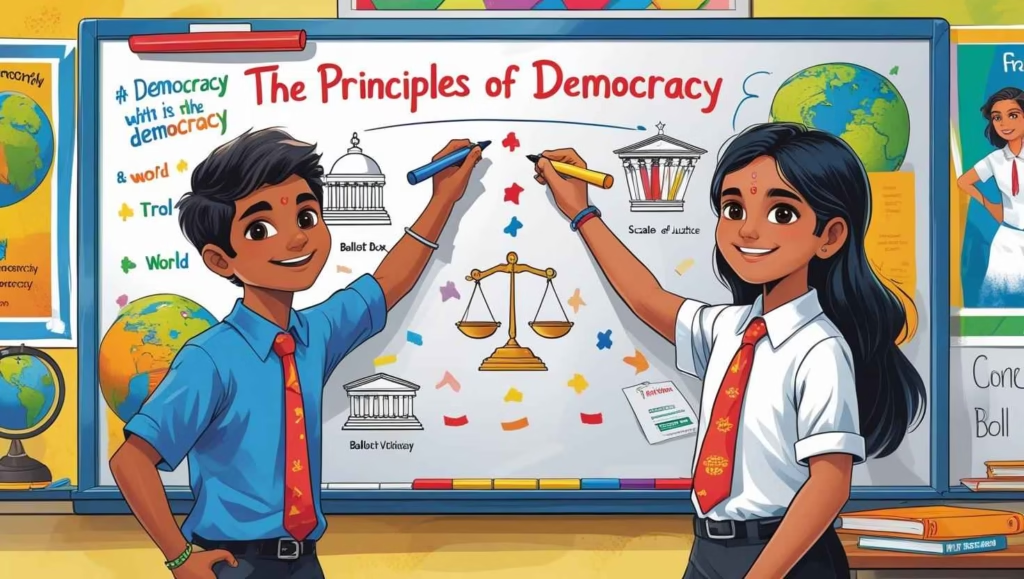
Arguments Against Democracy
Kartik: Ugh, Kavya! I heard people ranting: “Democracy is slow, corrupt, unstable…” 😤 Are they right?
Kavya: Let’s dissect these arguments! But remember—no system is perfect. Democracy’s like a bicycle 🚲: wobbly sometimes, but better than walking!
⚖️ Common Criticisms & Counterarguments
| Argument Against Democracy | Kartik’s Reaction | Kavya’s Rebuttal |
|---|---|---|
| 1. Frequent leadership change = Instability | “New leaders every 5 years? Chaos!” 😵 | “Stability isn’t stagnation! Change prevents dictatorship. 🔄 Would you want ONE class monitor for 20 years?” |
| 2. No morality, only power play | “Politicians just fight for chairs!” 💺 | “True, BUT democracy exposes corruption! Media + voters can punish bad actors. 🎯 Autocracies hide their sins!” |
| 3. Too many opinions = Delays | “Projects take forever! 🐌” | “Speed isn’t everything! Rushed decisions hurt people. Democracy ensures inclusive choices. 🧩” |
| 4. Bad decisions by ignorant voters | “Do all people understand complex issues?” 🤷♂️ | “Education fixes this! Should only ‘experts’ rule? Then scientists, not kings! 🔬 Plus, who decides who’s ‘expert’?” |
| 5. Electoral competition = Corruption | “Politicians bribe voters! 💰” | “Corruption exists in ALL systems! Democracy at least lets us VOTE OUT corrupt leaders! 🗳️” |
| 6. Ordinary people can’t decide | “Why let ‘dumb’ masses choose?” 🙄 | “Dangerous thinking! This justified kings, colonizers, dictators. Every voice matters!” ✊ |
❓ Critical Thinking Challenge:
- Which arguments attack democracy specifically? (Hint: Leadership changes, electoral corruption).
- Which apply to ANY government? (Delays, bad decisions, corruption).
- Can you add another argument? (e.g., “Democracy ignores long-term planning for short-term votes!”)
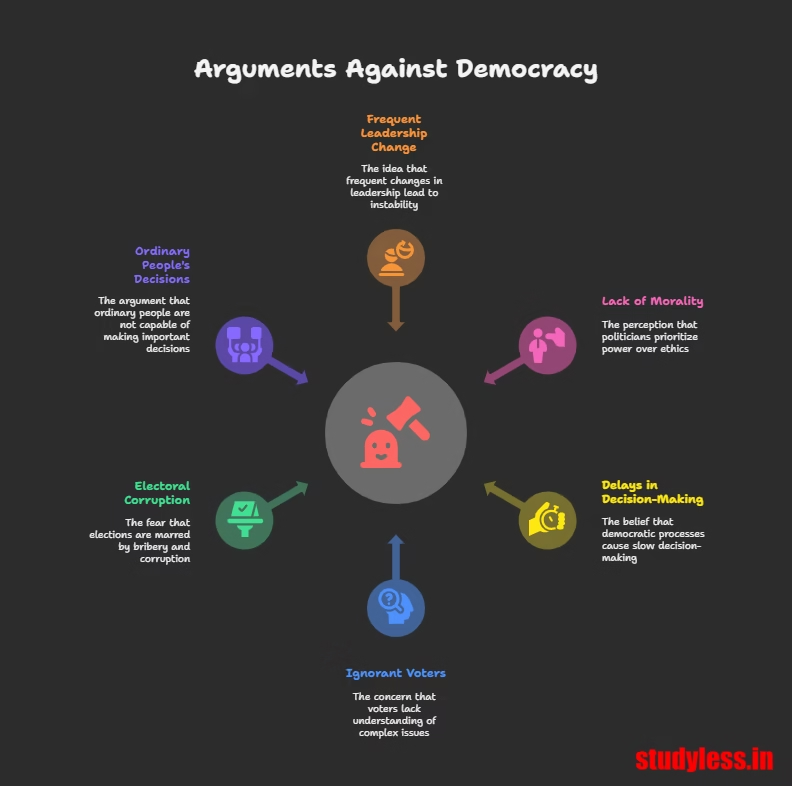
📝 Quick MCQ Check:
- What’s democracy’s BIGGEST strength against corruption?
a) Fewer leaders
b) Power to remove rulers via elections
c) Strict laws
d) Religious values
(Correct: b) ✅ - The “ordinary people can’t decide” argument is most similar to:
a) Monarchies 👑
b) Military rule 🪖
c) Both!
d) Anarchism
(Correct: c) ✅
Kartik: Okay, critics have points… But imagine alternatives:
- Monarchy? One family rules forever 👑 → No thanks!
- Dictatorship? “Efficient” but no freedom 🚫 → Hard pass!
Kavya: Exactly! Democracy’s real superpower? Self-correction 🔧. Bad leaders? Vote them out! Unjust laws? Protest! Courts? Sue!
💡 The Core Question:
“Is democracy better than the alternatives we can realistically choose?”
Kartik: Look at history—famines kill more in autocracies! Poverty drops faster in democracies! 📉
Kavya: Plus, dignity! Ever seen protestors in a dictatorship? 😢 Democracy gives hope even when it’s messy.
💭 Final Reflection:
Kavya: If your school project fails, do you quit group work? Or improve it? 🔧 Democracy’s a constant upgrade.
Kartik: So… Should we fix democracy’s flaws—or switch systems? What’s YOUR verdict?
(Fist bump) 🤜🤛
Democracy: Flawed, but fixable! 💪
To hte point: Democracy isn’t the “best” system—it’s the least bad. Why? Because it treats citizens as adults, not subjects. 🌱
Arguments FOR Democracy: Why People Power Wins! 🌟🗳️
(Kartik & Kavya Defend the People’s System) ✊
Kavya: Okay Kartik, critics called democracy “slow and messy”… but look at China’s famine (1958-61)! 😨 3 crore people died while democratic India AVOIDED famine despite similar poverty! Why?
Kartik: WHOA! Economists say: democracies listen to people. When food shortages hit, India’s leaders HAD to act—or get voted out! China’s rulers? No pressure → no action. 💔
💔
🏆 Democracy’s Superpowers:
| Argument | Why It Matters | Real-World Proof |
|---|---|---|
| 1. Accountability Saves Lives | Leaders MUST respond to people’s needs (or lose power!) 📢 | No famine in democratic history! 🍚 |
| 2. Better Decisions | Many voices → Fewer mistakes. Delays prevent rash choices! 🧠🤝 | India’s diverse input vs. China’s top-down orders |
| 3. Peaceful Conflict Fixer | No permanent “winners/losers.” Diversity = strength, not war! ☮️🌈 | India’s 100+ languages coexist! 🗣️ |
| 4. Dignity for ALL | Poor = Rich in voting booth. “Subjects” become “RULERS”! 👑→✊ | Farm worker’s vote = CEO’s vote! ⚖️ |
| 5. Self-Correction | Mistakes exposed → Fixed! No system hides flaws better. 🔧📢 | Laws change (e.g., LGBTQ+ rights!) 🏳️🌈 |
Kavya: Imagine China had free press, opposition parties, elections… those 3 crore might’ve lived! Democracy isn’t just efficient—it’s compassionate.
Kartik: And diversity? Only democracy turns differences into dialogue, not violence. Could a dictatorship keep India united? 🇮🇳
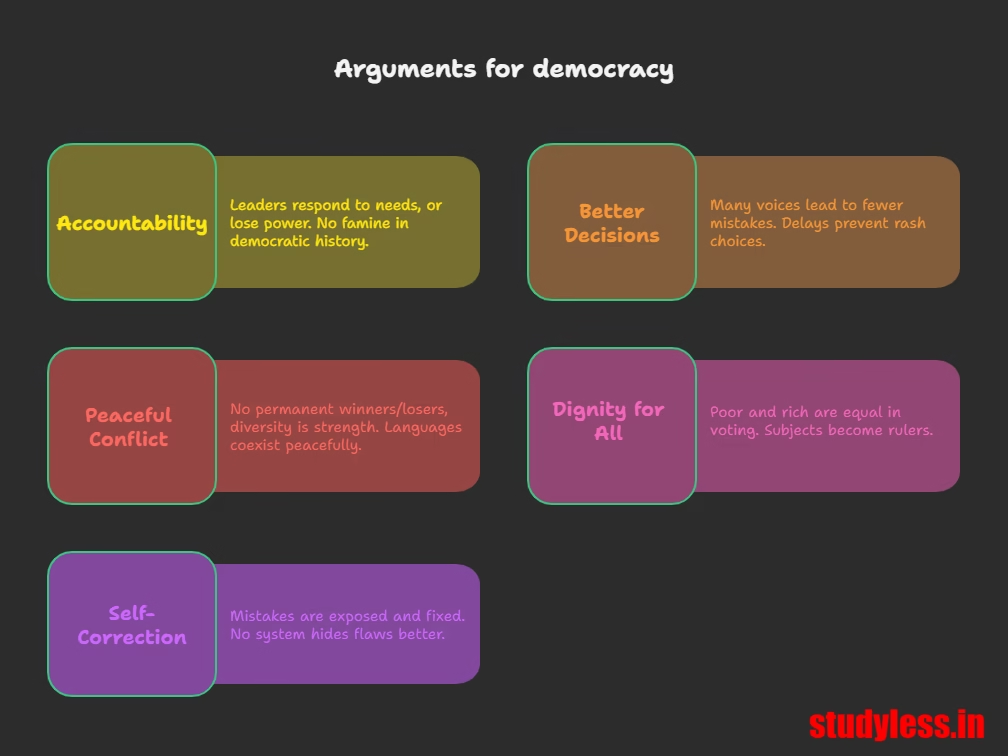
❓ Critical Thinking Qs:
- If your school ignored student feedback during a crisis, what would happen? 🏫
- Can “quick” autocratic decisions ever be better than slow democratic ones? (Think: Pandemics, wars)
📝 Quick MCQ Check:
- Why did India avoid China -level famines?
a) Better climate
b) Democratic accountability
c) Foreign aid
d) Smaller population
(Correct: b) ✅ - What makes democracy “self-correcting”?
a) Leaders are perfect
b) Mistakes are debated + fixed
c) No conflicts exist
d) Fast decision-making
(Correct: b) ✅
Kavya: Autocracies might build roads faster… but democracy builds hope, dignity, and resilience! 💪
Kartik: Exactly! Even when democracy stumbles, it has built-in crutches: free speech, elections, courts. Autocracy? When it falls, it CRASHES. 💥
💡 The Ultimate Argument:
“Democracy makes citizens owners of their fate—not beggars at a king’s table.”
Kavya: That’s why it’s the least worst system. It treats us as ADULTS—flaws and all.
Kartik: And hey—if you hate today’s leaders? You can fire them! Try that in a monarchy. 😉
💭 Final Reflection:
Kavya: If democracy is so great, why do people lose faith in it? (Hint: Are WE failing it?)
Kartik: And here’s a challenge: Design a school project where EVERY student’s voice shapes the outcome! How’d you do it?
(Fist bump) 🤜🤛
Democracy: Messy, Magical, and OURS to fix! 🔧❤️
Think over it
“Democracy doesn’t guarantee good governance—it guarantees the POWER to demand it.”
Never forget: China’s famine wasn’t just a tragedy—it was a failure of unaccountable power. Democracy is the antidote. 💉🌱
Broader Meanings of Democracy: Beyond Governments!
(Kartik & Kavya Explore Democracy in Daily Life) 🏠🌍
Kartik: Kavya, we’ve been stuck on democracy = government… but guess what? It’s everywhere! Like in my family—we debate pizza toppings like it’s Parliament! 🍕
Kavya: Same! My grandma says, “Democracy isn’t just voting; it’s listening to the smallest voice.” ✨ Let’s break it down!
🧩 Democracy’s Two Expansions:
| Aspect | Minimalist View (Govt Only) | Broader View (Life Everywhere) |
|---|---|---|
| Definition | Rulers elected by people ✅ | Method of equal consultation 🤝 |
| Applies to | National/state governments 🏛️ | Families, schools, parties, villages 🏫 |
| Goal | Distinguish democracies vs non-democracies 🧐 | Judge quality of democracy 📊 |
| Ideal Standard | Not covered ❌ | “No one sleeps hungry” 🍛 + Equal voice for all! 🌟 |
Kartik: So democracy isn’t just elections—it’s how decisions are made:
- Family: Kids + parents debate vacation spots 🗣️✈️
- School: Students question teachers 🧑🏫❓
- Parties: Leaders don’t hoard power! 🚫👑
Kavya: Exactly! And here’s the kicker—no country is a “perfect” democracy. It’s a constant work-in-progress! 🔧
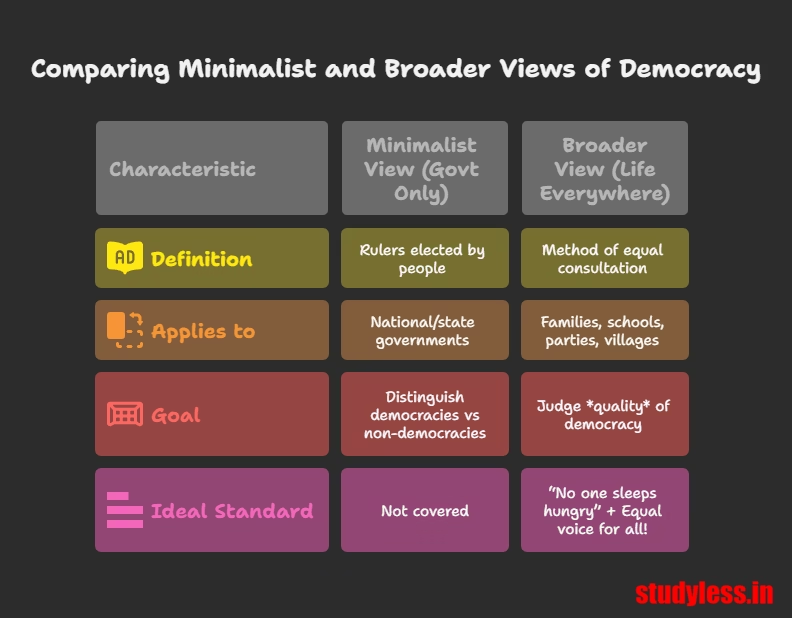
🌱 Why Broader Democracy Matters:
- Grassroots Power: Village Gram Sabhas decide locally! (No MPs needed).
- Equal Voice: Weak ≠ Ignored. Powerless get equal say 💬.
- Ideals > Reality: “True democracy” = No hunger + Equal resources. No nation achieves this yet!
- Citizens = Guardians: Democracy lives/dies by OUR participation—not just leaders!
Kartik: Think about it: Autocracies fear active citizens. Democracies NEED them!
❓ Critical Thinking Qs:
- Is your classroom democratic? Can students veto a test? If not, why? 📚
- Can a family be too democratic? (e.g., Toddlers voting on sleep time? 😂)
📝 Quick MCQ Check:
- What’s the core principle of broader democracy?
a) Frequent elections
b) Consultation + equal say for all affected
c) Powerful leaders
d) Fast decisions
(Correct: b) ✅ - Why is no country a perfect democracy?
a) All leaders are corrupt
b) Ideals (like zero hunger) aren’t fully achieved
c) Citizens are lazy
d) Constitutions are flawed
(Correct: b) ✅
Kavya: This chapter’s genius? It shows democracy is a culture, not just a system! Like a muscle—use it or lose it! 💪
Kartik: And here’s the challenge: How can YOU make your school/club/family more democratic TODAY?
💭 Final Reflection:
Kavya: If democracy dies when citizens yawn 😴… what’s ONE way you’ll participate this week? (Debate? Vote? Speak up?)
Kartik: And remember: Silence = Approval. If you see unfairness and stay quiet, democracy weakens!
(Fist bump) 🤜🤛
Be the democracy you wish to see! 🌟
Think over it :
“Democracy isn’t a spectator sport. Play your position.”
Next : We dive into CONSTITUTIONAL DESIGN —get ready! 🚀
Conclusion : What is Democracy Why Democracy
Kavya: Phew, Kartik! We’ve cracked democracy’s DNA 🧬—from elections 🗳️ to family debates 🏠. But here’s the truth bomb: Democracy isn’t a spectator sport. It’s a DOING word! ✊
Kartik: 100%! And if you ever feel lost—re-read this chapter. Spot the 4 features in news headlines! Track arguments for/against democracy in your community! Every revisit makes you sharper for exams… and life! 📚💡
🚀 Next Stop: CONSTITUTIONAL DESIGN!
Kavya: Now that we know what democracy is… how do we BUILD one? 🤔 Enter: Constitutions!
Kartik: Imagine democracy as a game ⚽. Next chapter, we learn:
- Who writes the rules? ✍️
- Who enforces them? ⚖️
- Can rules EVER change? 🔄
💬 Final Question to Ponder:
“If YOU were drafting a constitution for your school, what’s the FIRST right you’d guarantee?”
Think over it
You’re not just learning civics—you’re learning to shape the world. 🌍✨
Re-read. Debate. Question. And get ready to architect freedom in Constitutional Design! 🏗️🇮🇳
(Kartik & Kavya fist-bump) 🤜🤛
Stay curious, stay powerful! 🔥💫
Next Chapter Teaser:
Why do we need a constitution? How are the constitutions drawn up?
Who designs them and in what way?
What are the values that shape the constitutions in democratic states?
Once a constitution is accepted, can we make changes later as required by the
changing conditions?
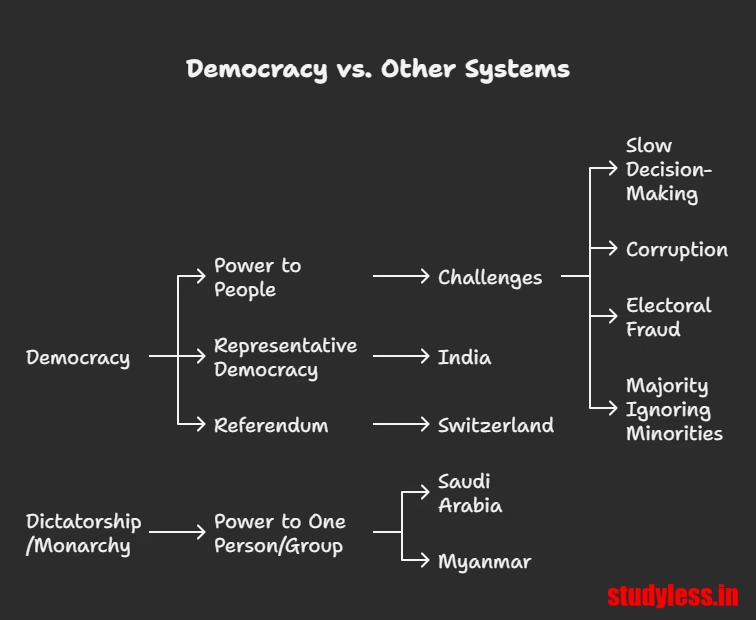
FAQS – What is Democracy Why Democracy
Q1: What is democracy?
A: A system where citizens elect rulers through free & fair elections, ensuring people’s voice and rights are protected.
Q2: Why is democracy important?
A: It promotes equality, resolves conflicts peacefully, holds leaders accountable, and protects freedoms (e.g., prevents famines like in non-democratic regimes).
Q3: What are the 4 key features of democracy?
A:
- Rule of law & respect for rights (constitutions > leaders).
- Elected rulers hold real power (not armies/kings).
- Free & fair elections where rulers can lose.
- One person, one vote, one value (equal voting rights).
Q4: How is democracy different from dictatorship/monarchy?
A: In democracy, power lies with people; in dictatorships/monarchies, power is with one person/group (e.g., Saudi Arabia’s monarchy, Myanmar’s military rule).
Q5: Why wasn’t Pakistan under Musharraf a true democracy?
A: Although elections were held, final power rested with the unelected army, not the people’s representatives.
Q6: What challenges do democracies face?
A: Slow decision-making, corruption, electoral fraud (e.g., Mexico’s PRI party), and risk of “majority ignoring minorities.”
Q7: Which is the most common form of democracy today?
A: Representative democracy (e.g., India), where citizens elect leaders to make decisions for them.
Q8: What is a referendum?
A: A direct public vote on a critical issue (used in direct democracies like Switzerland).
Q9: How to remember democracy’s features?
A: Use Kartik’s Mnemonic “P.E.E.R.”:
- Power to Elected leaders
- Elections free/fair
- Equal vote value
- Rights protected
Q10: What’s a high-scoring example for “arguments for democracy”?
A: Democracies avoid famines (e.g., India vs. China’s 1958-61 famine). Non-democracies ignore people’s needs.
Q11: Why is “broader democracy” (e.g., in families/schools) important?
A: It teaches equal consultation in daily life—vital for understanding democratic values beyond governments.
You may also like Explained! The French Revolution [Class 9 CBSE]
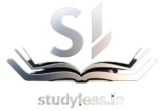
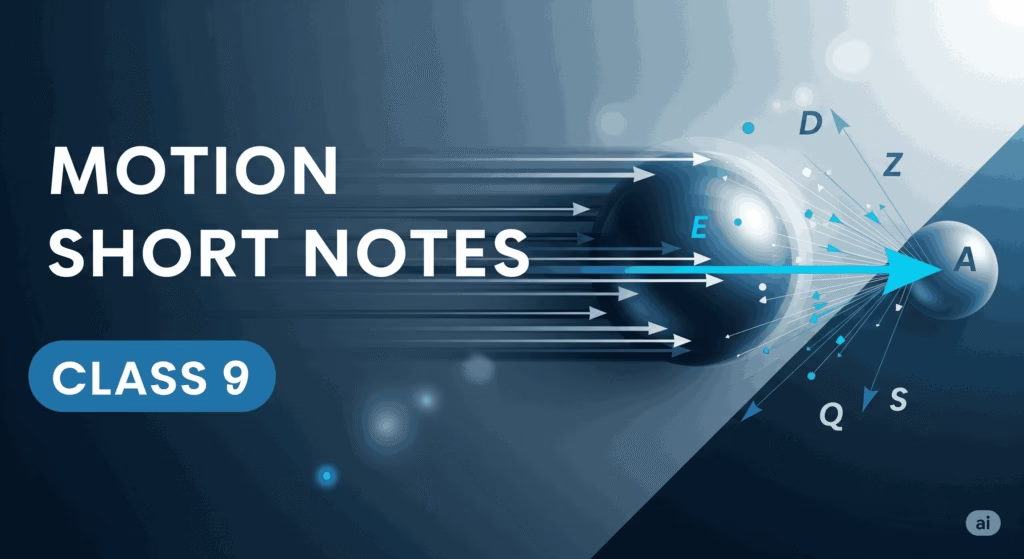


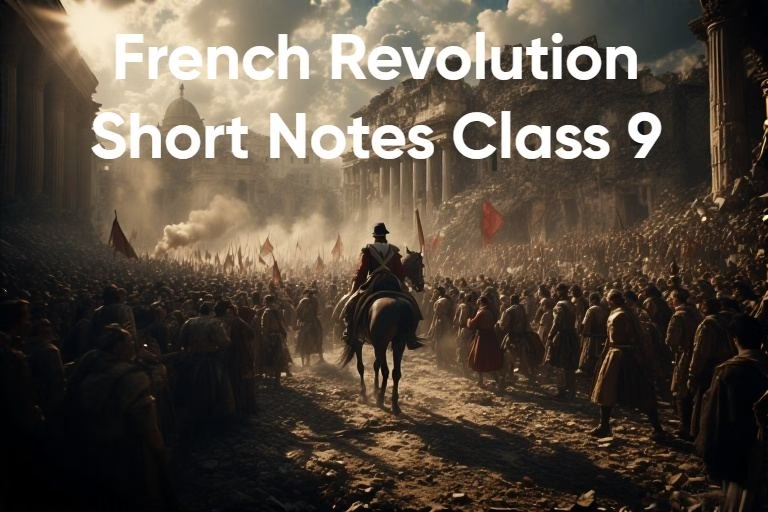
Leave a Comment